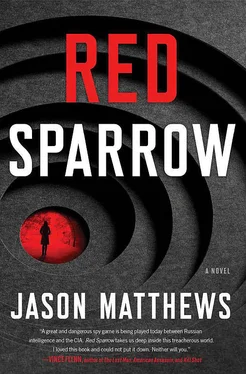Afterward, he kept taking sidelong glances at her while he made a pot of tea. Wrapped in a sweater and sitting at the kitchen table, Dominika guilelessly looked at him, and the psychologist in Mikhail simultaneously knew the sex had had nothing to do with him. He likewise knew he would say nothing about it, ever. And that they would never do it again. In a way, Mikhail was relieved.
=====
The operations course was coming to an end, the last leg of the tripod of training nearly complete. The exhausted pensioners who trained Dominika had long ago nicknamed her mushka, beauty spot, also the colloquialism for the front sight of a gun, the sight that picks up the target first. Completing their evaluations, they positively assessed her industrious spirit, they remarked on her intellect and wit and on her sometimes inexplicable intuitions on the street. Her loyalty and dedication to the Rodina were unquestioned. One or two pensioners noted that she was impatient. She could be argumentative, she needed to develop more flexibility in recruitment approaches. One old-timer alone wrote that despite her superior performance he believed she lacked true patriotic zeal. Her natural independence eventually would unseat her devotion. It was a feeling, an impression; he could not cite any examples. The comment was discarded as the addled thought of an old fool. In any case, Dominika was never shown any of the evaluations.
All that remained was a final practical exam on the street, using techniques, honing her tradecraft. A final exercise, a written examination, an exit interview. She was almost through. Before any of that happened, however, and to the consternation of her instructors, Dominika disappeared from the course: summoned immediately to the Center, “required for special duty,” was all they said.
=====
Dominika was told to report to a room at the other end of the fourth floor of Yasenevo, near the portraits of the directors. She knocked at a plain mahogany door and went inside. It was an executive dining room, small, wood-paneled, carpeted in deep wine-red, windowless. Polished wood and antique sideboards gleamed in the recessed lighting. Uncle Vanya was seated at the far end of a dining table covered by a snowy white tablecloth and set with Vinogradov porcelain. Crystal glasses twinkled in the light. He got up from his chair when he saw Dominika enter and walked down the length of the table to greet her with a vigorous hug around the shoulders. “The graduate has come home.” He beamed, holding her at arm’s length. “Top of your class, top marks on the street, I knew it!” He put her arm in his and walked her down the room.
There was another man sitting at the other side of the table, quietly smoking a cigarette. He looked to be fifty years old, with a red-veined tetrahedron for a nose. His eyes were dull and watery, his teeth corrugated and stained, and he slouched with the familiar casual authority honed on the razor strop of decades of Soviet officialdom. His tie was askew, his suit was a washed-out brown that recalled low tide at the beach. It matched the gaseous brown bubble that surrounded him as he sat. It was not the color—blacks and grays and browns assuredly were trouble—it was the paleness of the color and how it enveloped him in soft focus. He is bluzhdajushiy, devious, thought Dominika, not to be trusted.
Dominika sat across from him, meeting his appraising stare with unblinking eyes. Vanya sat at his place at the head of the table, his paws folded demurely in front of him. Unlike the former Soviet apparatchik across from her, Vanya as usual wore an elegant pearl-gray suit, blue shirt with starched collar, and a navy tie with minute white dots. On his lapel he wore a small red ribbon with a sky-blue star—for Merit to the Fatherland, Za Zaslugi Pered Otechestvom— for significant contributions to the defense of the Fatherland. Vanya lit a cigarette with a well-used silver lighter, which he snapped closed.
“This is Colonel Simyonov,” said Vanya, nodding in the direction of the slouching man. “He is the chief of the Fifth Department.” Simyonov said nothing, but leaned forward and flicked ash into a copper ashtray beside his plate. “We have identified a singular operational opportunity,” continued Vanya. “The Fifth has been given the responsibility to carry it out.” Dominika looked from Vanya to Simyonov dully. “I have recommended to the colonel that you would be uniquely suited to assist in the operation, especially since you have completed your training at the Academy with an excellent record. I wanted the two of you to meet.”
What is this nonsense? thought Dominika. “Thank you, General,” she said. She took care not to call him “Uncle” in the presence of a senior officer. “I still have two weeks to complete. There is a final exercise and the closing evaluations. I—”
“Your final evaluation is complete,” interrupted Vanya. “There is no need to return to the AVR. In fact, I want you to begin additional training in preparation for this operational assignment with Simyonov.” Vanya stubbed out his cigarette in an identical ashtray at his side.
“May I ask the nature of the assignment, General?” said Dominika. She looked at the two impassive faces. They both were too smart to give anything away with a look, but they didn’t know what else Dominika could see. Their respective bubbles swelled around their heads.
“For now it is sufficient to tell you that this is a potentially important case, a konspiratsia of some delicacy and sensitivity,” said Vanya.
“And the nature of the additional training?” asked Dominika. She kept her voice level, respectful. A door at the end of the room opened and an orderly entered carrying a silver salver on a tray.
“Lunch has arrived,” said Vanya, sitting up. “Let us talk about the project after we eat.” The waiter lifted the lid and began serving steaming golubtsi, large square cabbage rolls, fried brown and swimming in a thick sauce of tomato purée and sour cream. “The best of Russian cooking,” said Vanya, pouring red wine into Dominika’s glass from a silver decanter. This was a charade: Dominika’s newly trained operational antennae were buzzing. She had no appetite for the heavy food.
Lunch lasted a dreary half hour. Simyonov uttered three words the entire time, though he continued to stare at Dominika from across the table. His expression was one of distinct boredom, with an air of not wanting to be in the room. Finished eating, he scrubbed his mouth with his napkin and pushed away from the table. “By your leave, General,” he said. He gave Dominika another appraising look, nodded in her general direction, and left the room.
“Let’s have tea in my office,” said Vanya pushing back his chair. “We’ll be more comfortable there.”
Dominika sat warily upright on the couch in Vanya’s office, the view of the Yasenevo forest in front of them. Dominika was dressed in a white shirt and black skirt, her hair pinned up, the informal uniform at the Academy. Two glasses of steaming tea in magnificent antique Kolchugino podstakannik tea-glass holders sat on the table in front of them.
“Your father would be proud,” said Vanya, sipping carefully.
“Thank you,” said Dominika, waiting.
“I congratulate you on your achievement and on your entrance to the Service.”
“The training was challenging, but everything I could have hoped for,” said Dominika. “I am ready to start work.” It was true. She soon would be on the front lines.
“It is always an honor to serve your country,” he said, fingering the rosette on his lapel. “There is no greater honor.” He looked at his niece carefully. “This operation with the Fifth, it’s not something that comes along every day, especially not for a recent graduate.” He sipped at his tea.
Читать дальше












